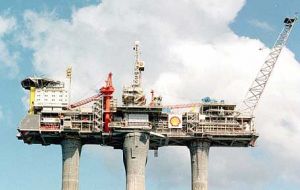MercoPress. South Atlantic News Agency
OPEC meeting in Abu Dhabi divided over pumping more oil
 Abu Dhabi to decide when “high is too high”
Abu Dhabi to decide when “high is too high” Oil prices rebounded Monday as speculation grew that OPEC may decide to leave output unchanged at a meeting this week in Abu Dhabi. New York's light sweet crude for January delivery, closed at 89.31 dollars per barrel and in London Brent North Sea crude jumped 1.54 dollars to settle at 89.80 dollars.
Both futures contracts earlier had fallen below 88 dollars, extending last week's losses on speculation that the powerful 13-member cartel would hike output amid signs of slowing US economic growth that could dampen demand in the world's biggest energy consumer. Last month New York crude hit a record high of 99.29 dollarspb. Ministers of the 13-member Organization of the Petroleum Exporting Countries began arriving Monday in the United Arab Emirates for a key meeting Wednesday to decide on output levels, signaling they were divided over the need to raise output to meet strong global demand. Ali al-Nuaimi, the oil minister of OPEC kingpin Saudi Arabia, said it was premature to talk about a possible increase in crude production by the cartel. "Right now it will be very premature to tell you what the assessment of oil data is", he said. "We have not looked at the data yet. Tomorrow (Tuesday) and the day after we will have an opportunity to look at all the data and then we will assess and decide" he said on his arrival in Abu Dhabi, the UAE capital. OPEC which supply roughly 40% of the world's oil is concerned that increasing output could oversupply the market, further dampening prices. But leaving output quotas unchanged on Wednesday could send oil prices to recent record highs above 99 dollars a barrel and even above the psychological 100-dollar mark for the first time. Libya's oil chief Shukri Ghanem, arriving in Abu Dhabi, dismissed the idea of a production hike. Asked whether OPEC would decide to increase oil output on Wednesday, Ghanem said: "I don't think so," adding that "the market is very well supplied." "I don't think that the market needs more oil," said Ghanem when asked if Libya would oppose an attempt to hike output. "If demand is going down, why should we increase". The pressure on OPEC to raise output has eased considerably because prices are now off recent record levels. Analysts believe the upcoming output decision Wednesday hinges on Saudi Arabia, the world's biggest oil producer and exporter and the only OPEC member with spare output capacity. Last week, prices fell heavily, with New York crude plunging by almost 10% amid concerns over slowing global energy demand sparked by remarks from US Federal Reserve chairman Ben Bernanke, who warned that strains in world financial markets may lead to broader economic problems.




Top Comments
Disclaimer & comment rulesCommenting for this story is now closed.
If you have a Facebook account, become a fan and comment on our Facebook Page!